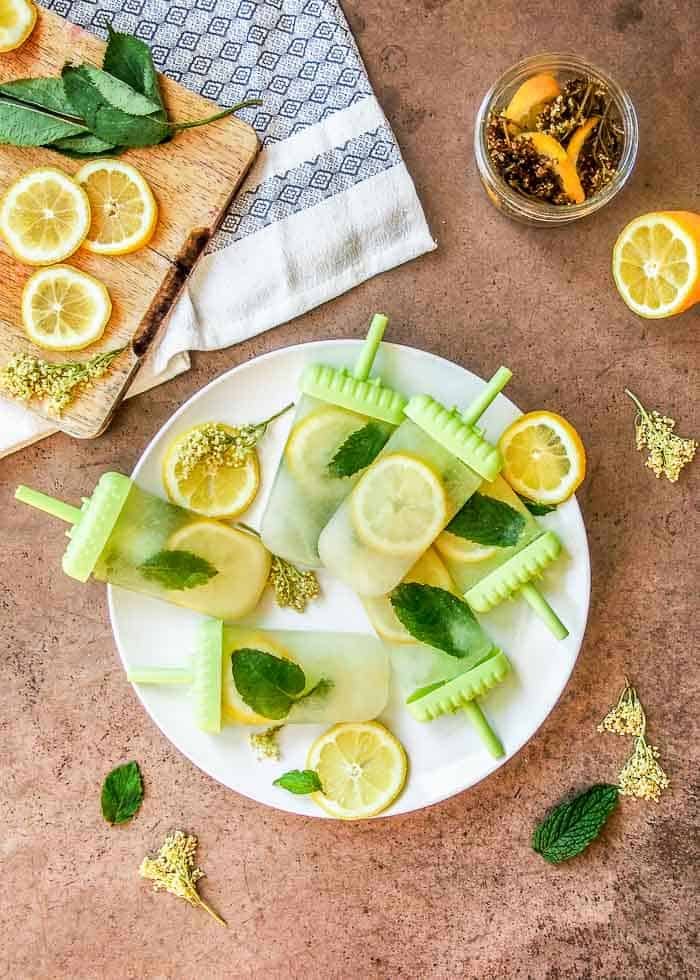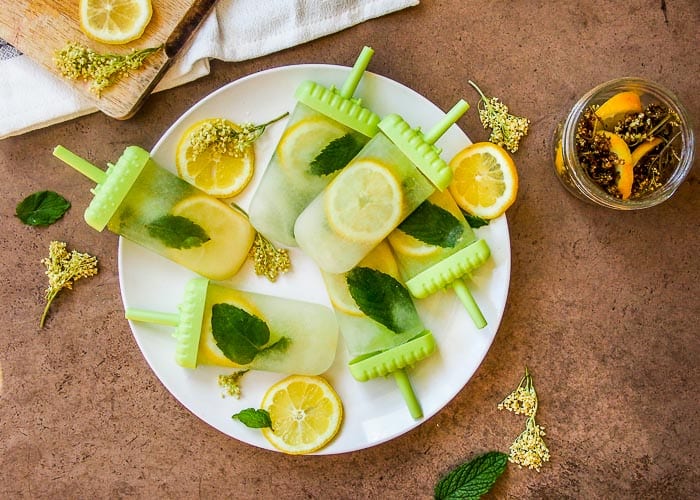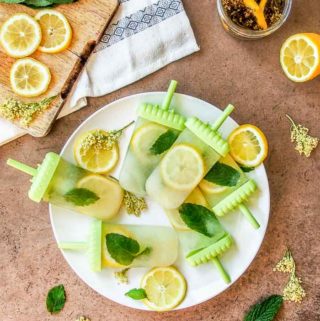This recipe uses the flower of the elderberry, which are the dark purple late summer berries that are used in pies, jams or medicinally. First, we have access to the flowers, and the white elderflowers, which are also edible, offer a more gentle medicinal quality. Elderberries are well recognized for their nutritional and medicinal qualities, but the elderflowers are also an important medicine.
Nutrition of Elderberry
Elderberry Extracts and the Flu
Clinical research on elderberry shows that some elderberry extracts may reduce flu-like symptoms. During 1999-2000 a study was done on 60 patients who received 15 ml (1 tablespoon) of elderberry or placebo syrup four times a day for 5 days. Symptoms were relieved on average 4 days earlier in those receiving elderberry extract compared with placebo (1).
Elderberry Echinacea Combinations and The Flu
One preliminary clinical study showed that taking a specific combination of elderberry and Echinacea helped improve the rate of recovery and reduced the rate of influenza-related respiratory complications (2).
Elderflower and Digestive Health
It’s not only the berry of the elder tree that has been linked to health benefits. Elderflower tea, when taken daily for 5 days, has been shown to be effective for managing constipation and increasing colonic transit time when combined with anise fruit, fennel fruit and senna flowers (3).
Elderflower and Honey for Seasonal Allergies
It has been speculated that those that suffer from seasonal allergies would benefit from consuming local unpasteurized honey which contains natural pollen. Exposure to small amounts of local pollen prior to hay fever season may help with symptom relief. One study using a very high dose of honey showed benefits after 8 weeks (4).
The same is said for elderflowers. Some herbalists believe a flower infusion to be beneficial for hay fever symptom relief, but only if started prior to pollen appearing. The combination of these two may be worth a try for anyone that suffers from hay fever.
Notes
Using Honey For Making The Elderflower Cordial
For this elderflower cordial recipe, I used honey which is a better alternative to white sugar due to its lower glycemic index and lesser effect on blood sugar levels. Regular cane sugar can be used in place of honey for a more traditional cordial recipe.
Don’t Have Popsicle Moulds?
I have used silicone ice cube trays to make mini-popsicles. You can choose to use a cut wooden popsicle stick, or go without a stick for a one-mouthful popsicle.
Flower Alternatives to Elderflower
What to enjoy these flower popsicles and don’t have access to elderflower? Try this recipe with fresh lavender, which also goes well with mint, or with rosemary. I have also done it with violets during their short season.
Other Uses for Elderflower
Making Elderflower Honey
Another simple medicine can be made by making elderflower honey. To do this, loosely pack elderflowers into a mason jar and pour over your local unpasteurized honey. If the honey doesn’t pour well let it sit in the sun for a few hours to warm it up. Let the elderflower and honey mixture sit in a warm area for at least a week and then strain.
Making Elderflower Cordial
My favourite way of combining honey and elderflower is making an elderflower cordial. Cordial will stay good in your fridge for months, so feel free to double or triple the recipe and use the additional cordial to add to sparkling water, to make into a syrup for pancakes, or to add to mixed drinks.
Elderflower Cordial Popsicle with Lemon and Mint
Ingredients
For The Cordial
- 1/2 cup water
- 1/2 cup honey unpasteurised
- 1/2 heaped cup elderflowers
- 1 organic lemon zested (then 1/2 juiced, and half thinly sliced)
For The Popsicles
- 1 organic lemon
- 12 mint leaves
- 2 cups water
Instructions
For The Cordial
- To prepare the elderflowers, rinse them in water and let them sit out to dry for 10 to 15 minutes to let any little bugs escape.
- Add the water and honey to a small saucepan, and heat until the honey is well incorporated. Don’t let it boil otherwise all the goodness from the honey will be killed off. I like to use a whisk to make sure it is well mixed.
- Remove from heat and once the honey and water mixture has cooled slightly, add the lemon zest, lemon slices from 1/2 the lemon, the juice from the remaining 1/2 lemon, and the elderflowers and stir to combine.
- Put a lid on the mixture and let sit out of the fridge for 12-24 hours; the longer you leave it the more intense the flavour.
- Once the mixture has infused, strain the mixture using a fine mesh strainer and collect the liquid in a bowl. Now you have a cordial that can be used just like any other cordial.
- The remaining lemon slices and flowers can be saved to make into a tea later. I leave mine in a mason jar in the fridge and add it to a tea within the following week.
For The Popsicles
- To make the popsicles, slice ½ a lemon into 6 thin slices, save the other half for the next batch of popsicles. Evenly distribute the lemon slices and 6 mint leaves into the 6 popsicle moulds.
- Mix ½ of the cordial mixture (about 1/2 cup) and 2 cups of water into a bowl. Carefully add this mixture to the popsicle molds being sure to leave at least ¼” on the top of the molds for the stick handle to fit in. Let freeze for at least 4 hours.
- To remove the popsicles from the molds, run under warm water for about 5 seconds and they should easily slide out. Use the remaining cordial, ½ lemon sliced and mint leaves to make 6 more popsicles.
- You may think it is odd to add fresh lemon and mint slices to a popsicle, but I find that when it comes to eating them the mint crisps up nicely and the lemon slices offer a welcomed tangy bite.
Notes
- Violets taste delicious, try combining these with thyme,
- Roses are a beautiful spring and summer flower, try combining these with rosemary.



Leave a Reply